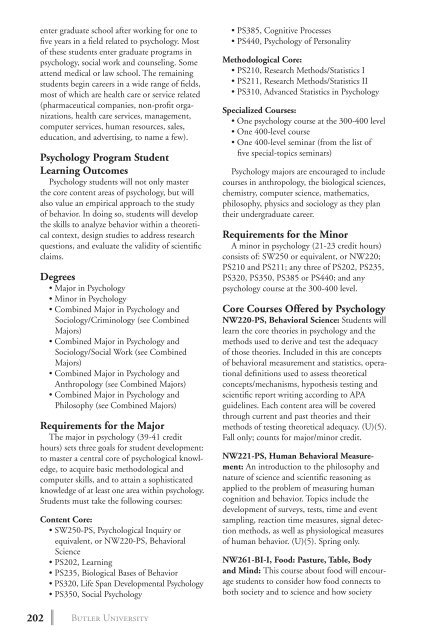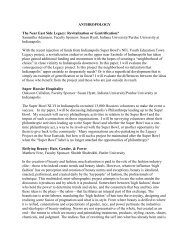2 0 1 3 bulletin - Butler University
2 0 1 3 bulletin - Butler University
2 0 1 3 bulletin - Butler University
You also want an ePaper? Increase the reach of your titles
YUMPU automatically turns print PDFs into web optimized ePapers that Google loves.
enter graduate school after working for one to<br />
five years in a field related to psychology. Most<br />
of these students enter graduate programs in<br />
psychology, social work and counseling. Some<br />
attend medical or law school. The remaining<br />
students begin careers in a wide range of fields,<br />
most of which are health care or service related<br />
(pharmaceutical companies, non-profit organizations,<br />
health care services, management,<br />
computer services, human resources, sales,<br />
education, and advertising, to name a few).<br />
Psychology Program Student<br />
Learning Outcomes<br />
Psychology students will not only master<br />
the core content areas of psychology, but will<br />
also value an empirical approach to the study<br />
of behavior. In doing so, students will develop<br />
the skills to analyze behavior within a theoretical<br />
context, design studies to address research<br />
questions, and evaluate the validity of scientific<br />
claims.<br />
Degrees<br />
• Major in Psychology<br />
• Minor in Psychology<br />
• Combined Major in Psychology and<br />
Sociology/Criminology (see Combined<br />
Majors)<br />
• Combined Major in Psychology and<br />
Sociology/Social Work (see Combined<br />
Majors)<br />
• Combined Major in Psychology and<br />
Anthropology (see Combined Majors)<br />
• Combined Major in Psychology and<br />
Philosophy (see Combined Majors)<br />
Requirements for the Major<br />
The major in psychology (39-41 credit<br />
hours) sets three goals for student development:<br />
to master a central core of psychological knowledge,<br />
to acquire basic methodological and<br />
computer skills, and to attain a sophisticated<br />
knowledge of at least one area within psychology.<br />
Students must take the following courses:<br />
Content Core:<br />
• SW250-PS, Psychological Inquiry or<br />
equivalent, or NW220-PS, Behavioral<br />
Science<br />
• PS202, Learning<br />
• PS235, Biological Bases of Behavior<br />
• PS320, Life Span Developmental Psychology<br />
• PS350, Social Psychology<br />
• PS385, Cognitive Processes<br />
• PS440, Psychology of Personality<br />
Methodological Core:<br />
• PS210, Research Methods/Statistics I<br />
• PS211, Research Methods/Statistics II<br />
• PS310, Advanced Statistics in Psychology<br />
Specialized Courses:<br />
• One psychology course at the 300-400 level<br />
• One 400-level course<br />
• One 400-level seminar (from the list of<br />
five special-topics seminars)<br />
Psychology majors are encouraged to include<br />
courses in anthropology, the biological sciences,<br />
chemistry, computer science, mathematics,<br />
philosophy, physics and sociology as they plan<br />
their undergraduate career.<br />
Requirements for the Minor<br />
A minor in psychology (21-23 credit hours)<br />
consists of: SW250 or equivalent, or NW220;<br />
PS210 and PS211; any three of PS202, PS235,<br />
PS320, PS350, PS385 or PS440; and any<br />
psychology course at the 300-400 level.<br />
Core Courses Offered by Psychology<br />
NW220-PS, Behavioral Science: Students will<br />
learn the core theories in psychology and the<br />
methods used to derive and test the adequacy<br />
of those theories. Included in this are concepts<br />
of behavioral measurement and statistics, operational<br />
definitions used to assess theoretical<br />
concepts/mechanisms, hypothesis testing and<br />
scientific report writing according to APA<br />
guidelines. Each content area will be covered<br />
through current and past theories and their<br />
methods of testing theoretical adequacy. (U)(5).<br />
Fall only; counts for major/minor credit.<br />
NW221-PS, Human Behavioral Measurement:<br />
An introduction to the philosophy and<br />
nature of science and scientific reasoning as<br />
applied to the problem of measuring human<br />
cognition and behavior. Topics include the<br />
development of surveys, tests, time and event<br />
sampling, reaction time measures, signal detection<br />
methods, as well as physiological measures<br />
of human behavior. (U)(5). Spring only.<br />
NW261-BI-I, Food: Pasture, Table, Body<br />
and Mind: This course about food will encourage<br />
students to consider how food connects to<br />
both society and to science and how society<br />
202<br />
<strong>Butler</strong> <strong>University</strong>
















